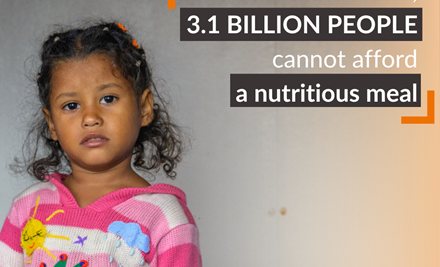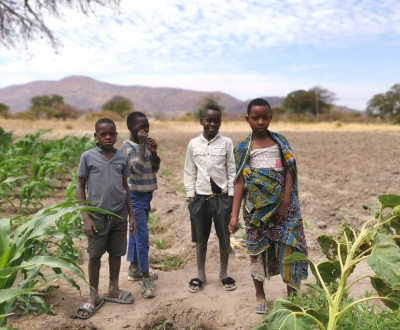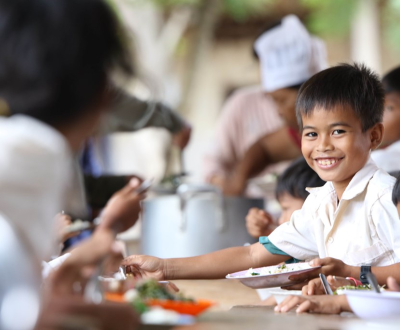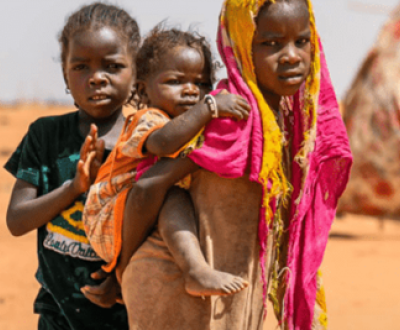This is a time of great upheaval. The triple planetary crisis of climate change, pollution and biodiversity loss is transforming the ways in which billions of people live their lives and the ways in which generations of families have survived. The increase in conflict and the legacy of COVID-19 are devastating multipliers. These issues compound one another and the greatest impact falls on the most vulnerable children. Hunger and malnutrition are where all of these issues culminate.
The Minister for Agriculture, Food and the Marine, Charlie McConalogue, will travel to the Horn of Africa for St Patrick’s Day, visiting Ethiopia, South Sudan and Kenya. It is a significant event for an Irish Agriculture Minister to use the annual St Patrick’s Day trip to focus on international development and humanitarian relief and it is a clear sign of the urgency the current situation presents.
This visit is prompted in part by Ireland’s membership of the Executive Board of the World Food Programme (WFP). The WFP, which was awarded the Nobel Peace Prize in 2020, is an international organisation within the United Nations that provides food assistance worldwide. As the WFP's largest implementing NGO partner for more than 19 years, we at World Vision are acutely aware of the great need for a strong WFP with sustained, multi annual funding.
For the first time since the 1960s, global hunger rates are increasing. Over 25 million children are at risk of starvation and 149 million are stunted due to the lack of nutritious food. The lifelong impact this has on a child’s health can rob them of their happiness, their potential, their education and too often, their life. There is now demonstrable evidence that the world is moving away from the Sustainable Development Goal (SDG) of ending hunger, food insecurity and malnutrition in all its forms, by 2030.
World Vision recently released a report, Price Shocks, which revealed that food prices are still higher than they were before the COVID-19 pandemic and the devastating impact this is having on vulnerable people around the world.
Our research shows that prices have continued to rise in the poorest countries, particularly those affected by violent conflict, climate extremes and forced displacement. Analysis of food prices from September 2023 shows that a food basket of regular household goods would cost the equivalent of 1.5 hours work in Australia or Ireland. In Burundi, the same food basket would cost the equivalent of 36 days and 25 days in the Central African Republic.
The report shows that the poorest countries have been hit the hardest by the impacts of inflation, COVID-19 and global insecurity. The price of a food basket rose the most in countries experiencing fluctuating or devalued currency, sustained or worsening conflict and violence, and where the effects of climate change are wiping out food producers. This puts some of the most basic kitchen staples out of reach for millions, resulting in rapidly increasing numbers of those suffering from acute hunger and malnutrition.
At a time of unprecedented global hunger, a triple planetary crisis and widespread global conflict, the World Food Programme has been forced to make drastic cuts to its programming due to a collapse in its funding. There is currently a 60% shortfall in WFP’s funding and WFP is having to make significant cuts in nearly half of its 86 country operations. We see the impact of this first-hand in our programmes – our colleagues face the daily challenge of deciding who does and does not get their food ration because of these funding cuts.
At World Vision Ireland, we are very proud of the Irish Government’s continued support for the work of the WFP. The Irish Government is a strong advocate for the WFP and has provided significant support to the Organisation in 2023 which continues in 2024. It shows committed leadership through the WFP-Ireland Strategic Partnership Agreement 2022-2024, in which Ireland has increased its core funding to €75 million.
We would urge the Irish Government to continue to advocate for international donors to meet the crisis pledge targets that have been agreed. We need committed donors like Ireland to ensure that the WFP and partners like Word Vision do not have to continue to make life and death cuts to their programming.
Gillian Barnett
Chief Executive Officer, World Vision Ireland



